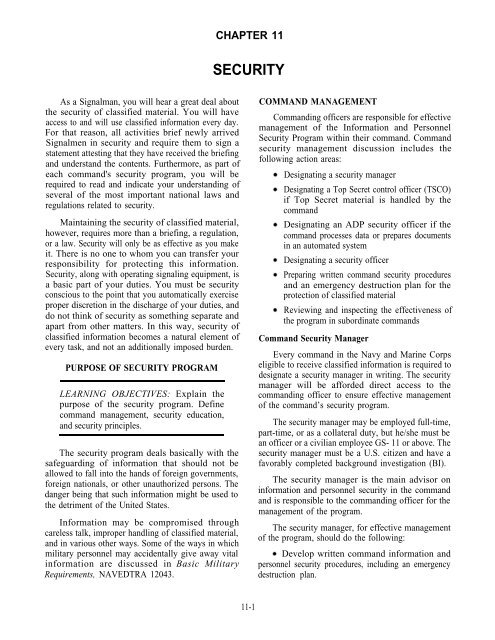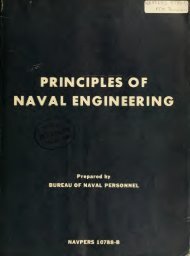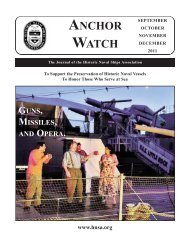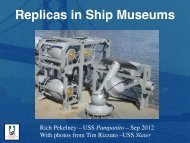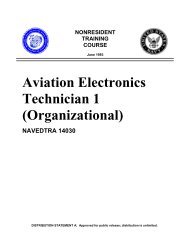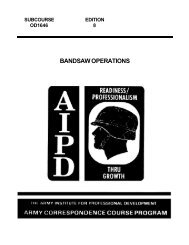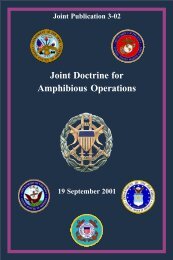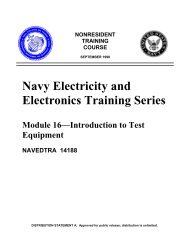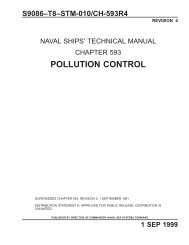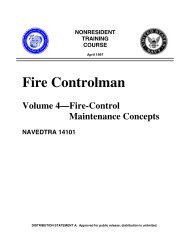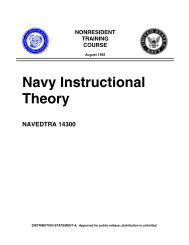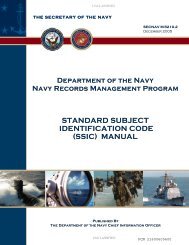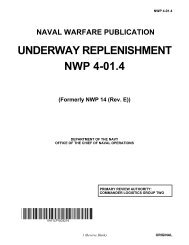- Page 1 and 2:
NONRESIDENTTRAININGCOURSEJuly 1996S
- Page 3:
COMMANDING OFFICERNETPDTC6490 SAUFL
- Page 7 and 8:
PREFACEBy enrolling in this self-st
- Page 9 and 10:
CONTENTSCHAPTERPAGE1. Introduction
- Page 11:
PASS/FAIL ASSIGNMENT PROCEDURESIf y
- Page 15 and 16:
CHAPTER 1INTRODUCTION TO VISUAL COM
- Page 17 and 18:
Phonetic AlphabetSome of the words
- Page 19 and 20:
SPOTTERThe spotter is the most valu
- Page 21 and 22:
CLASSIFICATIONCommunications Proced
- Page 23 and 24:
CHAPTER 2SIGNAL EQUIPMENTBefore Sig
- Page 25 and 26:
Five resistors are connected in par
- Page 27 and 28:
Because the lamp contains gas under
- Page 29 and 30:
Figure 2-7.—AN/SAT 2 infrared tra
- Page 31 and 32:
Figure 2-10.—Power conversion uni
- Page 33 and 34:
You were born with the finest optic
- Page 35 and 36:
assembly. Take care to keep lubrica
- Page 38 and 39:
The following steps are required to
- Page 40 and 41:
eye. Each eyepiece is adjustable th
- Page 42 and 43:
you may hear the sound of gas escap
- Page 44 and 45:
Figure 2-23.—Measuring and taping
- Page 46 and 47:
Page 2-24.Figure 2-24.—Completing
- Page 48 and 49:
off the remaining tail at this poin
- Page 50 and 51:
granted by the officer of the deck
- Page 52 and 53:
ADDRESS OF MESSAGEMost messages hav
- Page 54 and 55:
Figure 3-3.—Parts of a naval mess
- Page 56 and 57:
Figure 3-4.—The precedence of a m
- Page 58 and 59:
abbreviated service messages, the B
- Page 60 and 61:
Standing alone, prosign C means “
- Page 62 and 63:
Voice Call SignsVoice call signs ar
- Page 64 and 65:
Figure 3-6.—Numeral pennant call
- Page 66 and 67:
SHIPS' BOATS.—The following visua
- Page 68 and 69:
types of messages that you will be
- Page 70 and 71:
with other civil stations unless it
- Page 72 and 73:
Call SignsThe following call signs
- Page 74 and 75:
When required, a full answer, consi
- Page 76 and 77:
To request repetition of the second
- Page 78 and 79:
3. The aircraft should be maneuvere
- Page 80 and 81:
the receiving station follows suit
- Page 82 and 83:
SECURITYIn the interest of security
- Page 84 and 85:
ooks are transmitted by voice radio
- Page 86 and 87:
Table4-2.—Prowords—ContinuedPRO
- Page 88 and 89:
Table 4-2.-Prowords—ContinuedPROW
- Page 90 and 91:
EXECUTIVE METHODThe executive metho
- Page 93 and 94:
CHAPTER 5ALLIED FLAGHOIST PROCEDURE
- Page 95 and 96:
Figure 5-2.—Numeral pennants; spe
- Page 97 and 98:
More information on the hoisting of
- Page 99 and 100:
to the addressees or to the OTC if
- Page 101 and 102:
Example:If a junior commanding offi
- Page 103 and 104:
The SCREEN pennant is spoken, writt
- Page 105 and 106:
The letter N is also used for minus
- Page 107 and 108:
executive signal will be made by li
- Page 109 and 110:
CHAPTER 6INTERNATIONAL SIGNALINGIn
- Page 111 and 112:
Flashing light or sound signaling:
- Page 113 and 114:
CallingThe identity signal of the s
- Page 115 and 116:
These examples illustrate the conve
- Page 117 and 118:
Figure 6-1.—Morse signaling by ha
- Page 119 and 120:
5. MISCELLANEOUS6. METEOROLOGY—WE
- Page 121 and 122:
Figure 6-2.—Distress signals.A si
- Page 123 and 124:
Figure 6-3.—Lifesaving signals (p
- Page 125 and 126:
Figure 6-3.—Lifesaving signals (p
- Page 127 and 128:
signal is not hoisted to the dip; i
- Page 129 and 130:
CHAPTER 7CONVOY COMMUNICATIONSAltho
- Page 131 and 132:
Ships that pass through the MERZONE
- Page 133 and 134:
Figure 7-1.—Convoy formation grid
- Page 135 and 136:
TAKING UP FORMATIONWhen forming a c
- Page 137 and 138:
RADIOTELEGRAPHRadiotelegraph messag
- Page 139 and 140:
CHAPTER 8WATCHSTANDING DUTIESVisual
- Page 141 and 142:
Signalmen must be alert to respond
- Page 143 and 144:
where persons have fallen overboard
- Page 145 and 146:
Figure 8-2.—Visual communications
- Page 147 and 148:
Figure 8-3.—Watch-to-watch invent
- Page 149 and 150:
SIGNALTable 8-2.—Signals from a S
- Page 151 and 152:
Figure 8-4.-Vari-color signal illum
- Page 153 and 154:
Multipurpose LampWhen using the por
- Page 155 and 156:
Approach ShipThe approach ship main
- Page 157 and 158:
Figure 8-7.—Transfer-station mark
- Page 159 and 160:
CHAPTER 9NAVIGATIONAL DUTIESNavigat
- Page 161 and 162:
possible, then, to obtain relative
- Page 163 and 164: distance on a Mercator chart, one m
- Page 165 and 166: periodical announces new nautical c
- Page 167 and 168: CLASS ABBREVIATION GENERAL DESCRIPT
- Page 169 and 170: Sectors may be only a few degrees w
- Page 171 and 172: Figure 9-12.—IALA Maritime Buoyag
- Page 173 and 174: is used to describe any buoy that i
- Page 175 and 176: TopmarksBy day, topmarks are the mo
- Page 177 and 178: -Spoil ground marksMilitary exercis
- Page 179 and 180: Head-on SituationWhen two ships mee
- Page 181 and 182: Figure 9-22.—Pilot vessel, under
- Page 183 and 184: Figure 9-24.—Towing vessels less
- Page 185 and 186: Dredging/Underwater OperationWhen a
- Page 187 and 188: Figure 9-28.—Pushing ahead or tow
- Page 189 and 190: INTERNATIONALMAKING WAYINLANDMAKING
- Page 191 and 192: CHAPTER 10HONORS AND CEREMONIESFrom
- Page 193 and 194: When displayed with foreign ensigns
- Page 195 and 196: way do not half-mast the ensign alt
- Page 197 and 198: Figure 10-2.—Personal flags and c
- Page 199 and 200: concerned, or the senior officer pr
- Page 201 and 202: commission that has no flag officer
- Page 203 and 204: BOAT HAILSBoat hails are used durin
- Page 205 and 206: PresidentTable 10-4.—Passing Hono
- Page 207 and 208: termination of the call, ruffles an
- Page 209 and 210: Page 10-19Figure 10-5.—Personal f
- Page 211 and 212: RED CROSS FLAGThe Red Cross (Geneva
- Page 213: NOTEOn a flagship where the command
- Page 217 and 218: exceptionally grave damage to the n
- Page 219 and 220: A personnel security clearance is a
- Page 221 and 222: Table 11-1 identifies the minimum r
- Page 223 and 224: Figure 11-1.—Security Container R
- Page 225 and 226: with new cannibalized parts. A cont
- Page 227 and 228: Figure 11-4.—Security Container C
- Page 229 and 230: The accounting system for an activi
- Page 231 and 232: shredding, provided the destruction
- Page 233 and 234: CHAPTER 12AMPHIBIOUS DUTIESA specia
- Page 235 and 236: Figure 12-2.—Landing craft mechan
- Page 237 and 238: Figure 12-4.—Landing craft assemb
- Page 239 and 240: their final movement to the beach.
- Page 241 and 242: This section discusses the duties a
- Page 243 and 244: Figure 12-8.—Beach flags, markers
- Page 245 and 246: is used in beach flags and markers
- Page 247 and 248: Figure 12-9.—Standard flags and i
- Page 249 and 250: Figure 12-12.—Floating dump cargo
- Page 251 and 252: Figure 12-14.—Amphibious grid ref
- Page 253 and 254: Battle speed (ALFA)“TWO BLUE ONE,
- Page 255 and 256: speed desired. For example, 7 indic
- Page 257 and 258: Figure 12-16.—Arm and hand contro
- Page 259 and 260: Figure 12-16.—Arm and hand contro
- Page 261 and 262: Flgure 12-16.—Arm and hand contro
- Page 263 and 264: Figure 12-16.—Arm and hand contro
- Page 265 and 266:
CHAPTER 13AIRCRAFT AND SHIP IDENTIF
- Page 267 and 268:
Fuselage TypesUse of the fuselage i
- Page 269 and 270:
Figure 13-10.—Position of the hor
- Page 271 and 272:
Figure 13-12.—Classes of aircraft
- Page 273 and 274:
Figure 13-15.—Classes of destroye
- Page 275 and 276:
Figure 13-l8.—Classes of amphibio
- Page 277 and 278:
Figure 13-19.—Recognition silhoue
- Page 279 and 280:
Figure 13-20.—Transliteration tab
- Page 281 and 282:
Figure 13-23.—General profile app
- Page 283 and 284:
Attack SubmarinesAttack submarines
- Page 285 and 286:
Figure 13-27.—Type selector.13-21
- Page 287 and 288:
MastsA mast is a post that has no c
- Page 289 and 290:
Maier—An outward curve, all round
- Page 291:
write her up and pass it to the off
- Page 294 and 295:
You should become familiar with cri
- Page 296 and 297:
oard. It would be a good idea to re
- Page 298 and 299:
. The method of transmission must b
- Page 300 and 301:
Greenwich hour angle of the mean su
- Page 303 and 304:
APPENDIX IIFLASHING LIGHT AND SEMAP
- Page 305 and 306:
minute, an experienced SM probably
- Page 307 and 308:
Drill 9Drill 10XS8LO G3UCA AGC3U Q3
- Page 309 and 310:
Figure AII-4.—Semaphore position
- Page 311:
Drill 6 GMOLJ DFDJA LNJXE QFGPR Dri
- Page 314 and 315:
Chapter 4Communication Instructions
- Page 317 and 318:
INDEXAAccounting and control, 11-14
- Page 319 and 320:
Disposition of classified material,
- Page 321 and 322:
Merchant ship identification—Cont
- Page 323:
Storage, 11-7combinations, 11-8keys
- Page 327 and 328:
ASSIGNMENT 1Textbook Assignment: "S
- Page 329 and 330:
1-26. What weather condition causes
- Page 331 and 332:
1-53.1-54.1-55.1-56.1-57.l-58.What
- Page 333 and 334:
ASSIGNMENT 2Textbook Assignment: "A
- Page 335 and 336:
2-27.2-28.2-29.2-30.2-31.2-32.What
- Page 337 and 338:
2-53. In international communicatio
- Page 339 and 340:
ASSIGNMENT 3Textbook Assignment: "C
- Page 341 and 342:
3-25. The OOD wants you to inform t
- Page 343 and 344:
3-51.3-52.You are entering port, yo
- Page 345 and 346:
ASSIGNMENT 4Textbook Assignment:"Ho
- Page 347 and 348:
4-23.What is a compromise called wh
- Page 349 and 350:
4-49.4-50.4-51.4-52.4-53.4-54.4-55.
- Page 351:
4-74. What part of an Oporder gives


